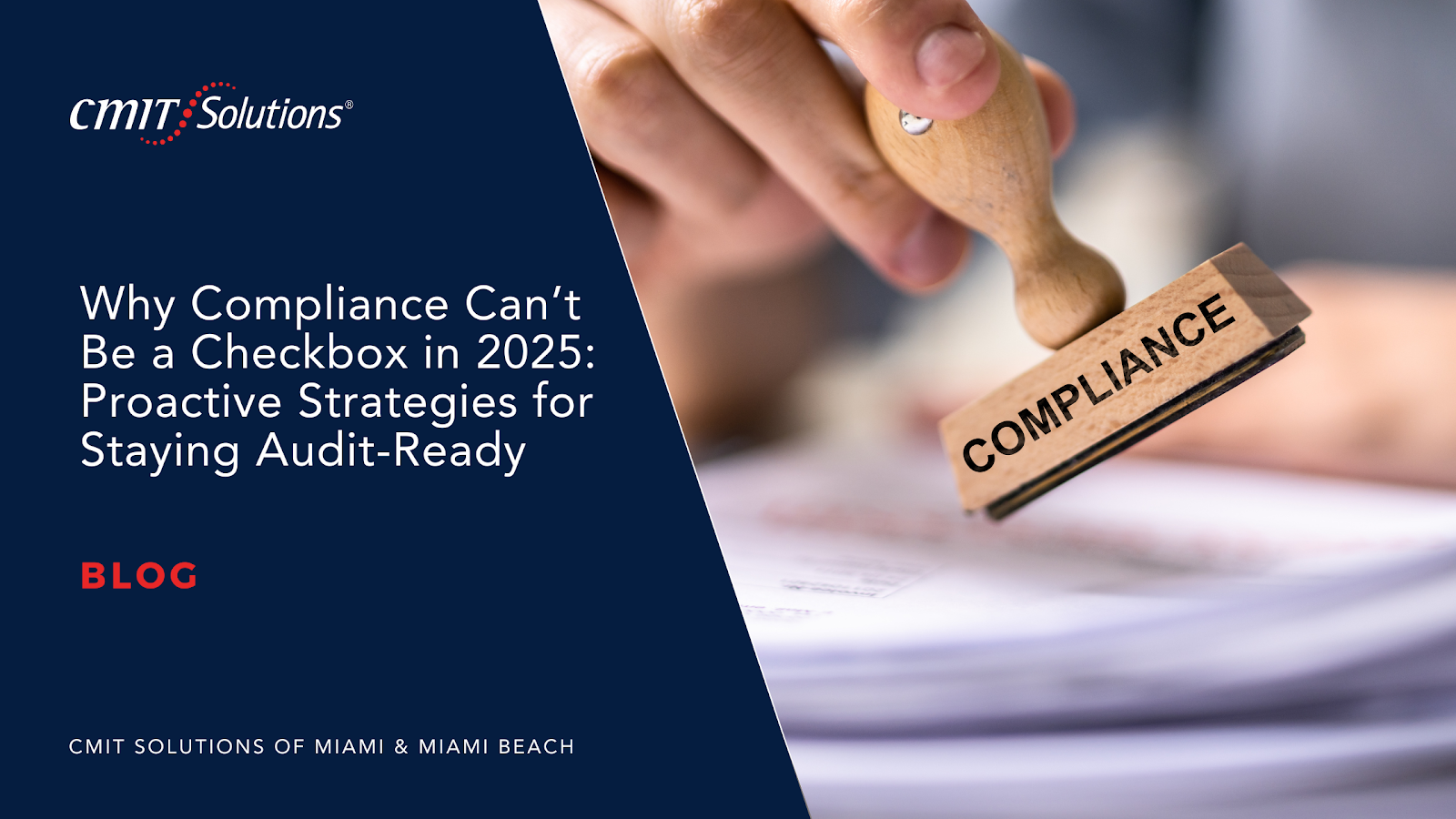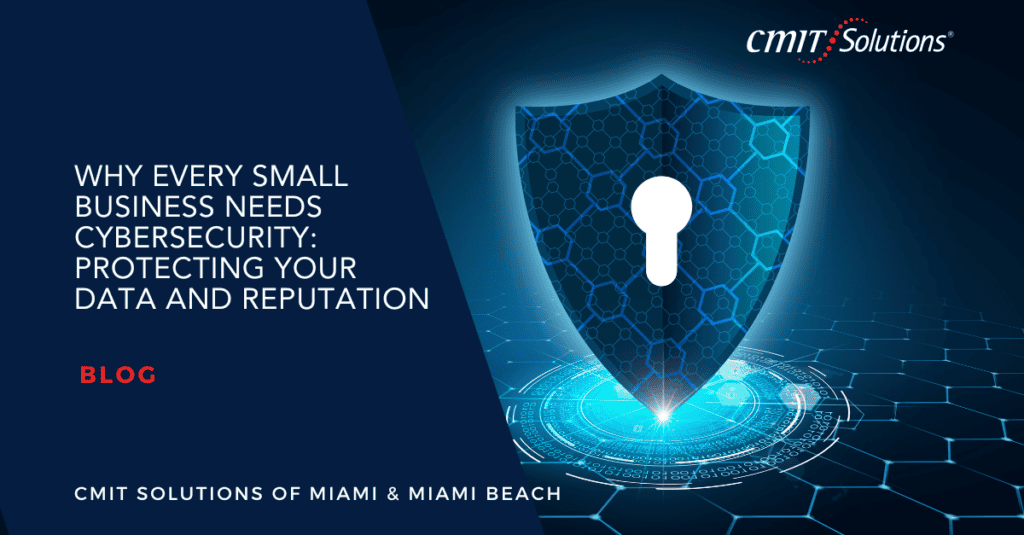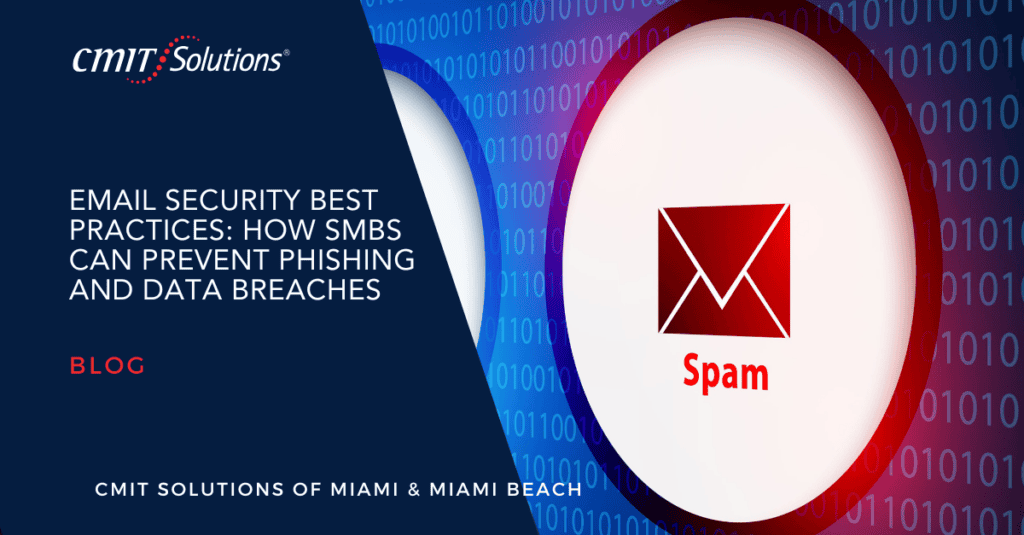For small and mid-sized businesses in Miami and Miami Beach, IT compliance is no longer a back-office formality—it’s a front-line defense. With cyberattacks on the rise and regulators sharpening their scrutiny, staying audit-ready requires a strategic mindset, not just periodic check-ins. In today’s climate, compliance is a continuous journey that demands proactive planning, robust cybersecurity, and technology partners who understand both the local landscape and the national regulatory tide.
The Changing Rules
Regulations like HIPAA, CCPA, GDPR, and PCI DSS have shifted significantly in the past few years. Compliance for small businesses is no longer optional. With Florida and other states ramping up their local enforcement, SMBs can’t rely on outdated policies or assumptions. in the past few years. With Florida and other states ramping up their local enforcement, SMBs can’t rely on outdated policies or assumptions. Staying compliant in this dynamic environment means understanding where your business stands and what new expectations regulators—and your customers—have.
That’s why many organizations are turning to solutions that combine cybersecurity best practices with managed IT services to ensure compliance is always up to date. These solutions don’t just address current requirements but future‑proof your infrastructure as new laws emerge.
Moving Beyond the Break-Fix Mentality
Traditional IT strategies take a break‑fix approach to security: fix the problem when it happens. That mindset no longer works in a landscape dominated by cyber threats. But compliance can’t wait for a breach. Businesses must adopt proactive strategies that identify gaps before they become audit failures.
One powerful solution is adopting tools like SIEM platforms such as Microsoft Sentinel, which consolidate logs, track anomalies, and send alerts for suspicious activities. Combined with endpoint detection and response (EDR) tools, these strategies make it easier to monitor compliance and detect vulnerabilities in real time.
Cybersecurity as the Backbone of Compliance
Cybersecurity and compliance are intertwined. As highlighted in our cybersecurity essentials, HIPAA or GDPR compliance is impossible if your systems are exposed to threats. Whether it’s customer data, financial records, or intellectual property, vulnerabilities in your IT environment could quickly turn into costly regulatory violations.
That’s why more small businesses in Miami are investing in multi‑layered cybersecurity strategies to harden their networks and avoid penalties. Firewalls, antivirus software, multi-factor authentication, and endpoint detection tools all play a role in preventing unauthorized access and minimizing attack surfaces. But beyond implementing these tools, businesses must ensure they’re updated, monitored, and integrated within a broader compliance framework.
From email security best practices to 24/7 monitoring and response, companies must integrate comprehensive defenses that demonstrate due diligence. This level of protection isn’t just for auditors—it reassures clients, fortifies internal operations, and protects brand reputation in an increasingly risky digital world.
Staying Ready with Smart IT Management
SMBs can’t afford dedicated compliance departments. That’s why managed IT services are becoming essential to audit readiness.. That’s where managed IT services come into play. A proactive IT partner can help ensure ongoing compliance through routine audits, automated patch management, and continuous system monitoring.
Instead of scrambling before an audit, businesses can rely on outsourced IT support that keeps systems aligned with regulatory expectations year‑round. These services also scale with your business, supporting growth without sacrificing compliance.
Protecting Data Through Recovery Planning
Many compliance frameworks now require robust data backup and disaster recovery (BDR) protocols. Without a tested plan in place, businesses risk data loss, regulatory fines, and operational shutdowns. For more insights, see our resource on building a strong disaster recovery plan. In industries that handle sensitive customer data—such as healthcare, finance, or legal services—even minor disruptions can cascade into severe consequences.
Resilient BDR planning involves more than setting up backups; it requires clearly defined processes, scheduled recovery drills, and a deep understanding of recovery time objectives (RTOs) and recovery point objectives (RPOs). Businesses must regularly test these strategies to ensure they function effectively during a real-world event. An untested recovery plan provides a false sense of security that could prove catastrophic in the event of a breach or outage.
By using cloud‑based disaster recovery solutions and redundant backups, Miami SMBs can meet compliance requirements while strengthening their resilience. Learn more about how to choose the right data backup solution to fit your organization’s needs. It’s not just about storing data—it’s about being able to restore it quickly and completely. Solutions tailored to industry-specific compliance standards offer added assurance that restoration timelines meet regulatory benchmarks, preserving both uptime and trust.
Training People to Protect Systems
Compliance isn’t just a tech issue—it’s a people issue. As discussed in our cybersecurity training article, untrained employees are the leading cause of compliance violations.. Untrained employees are the leading cause of compliance violations and cyber incidents. That’s why ongoing cybersecurity awareness training is a requirement in many standards.
From recognizing phishing attempts to securing remote work environments, employee behavior directly affects audit readiness. Businesses should implement regular training programs, updated policies, and test scenarios to verify understanding.
Empowering Employees Through Training
A well-structured training program doesn’t just help employees recognize threats—it empowers them to become active defenders of your organization’s compliance strategy. Embedding training into your operations can yield numerous advantages that go beyond ticking a regulatory box:
- Improved Response Time: Trained staff can identify and escalate threats quickly, minimizing damage and regulatory exposure.
- Reduced Human Error: With consistent refreshers, employees are less likely to fall for phishing scams or mishandle sensitive data.
- Cultural Buy-In: Compliance becomes part of your company culture rather than an external burden, leading to more sustained outcomes.
Using Compliance to Win Trust
In a world of increasing privacy concerns, businesses that demonstrate compliance gain a clear competitive edge. Clients, partners, and regulators alike look for signs that a company is trustworthy, secure, and responsible with data. Being audit‑ready sends a clear message to stakeholders: your organization takes security seriously and operates with integrity.
A proactive approach to compliance can elevate brand reputation and serve as a key differentiator in competitive industries. It shows that your business isn’t just reacting to threats but actively working to prevent them. In fact, many customers now include security and compliance readiness as part of their vendor selection process—making these initiatives critical to winning new business and retaining loyal clients.
Whether you’re navigating IT compliance in Florida or expanding into national markets, proactive compliance strategies build trust, reduce liability, and protect growth. It’s time for SMBs to shift from viewing compliance as a burden to leveraging it as a business enabler and relationship-builder that fosters long-term resilience and credibility.
Conclusion
Compliance in 2025 isn’t about checking a box—it’s about staying a step ahead. With regulators increasing scrutiny and cyber threats becoming more complex, the businesses that will thrive are the ones that make compliance central to their IT strategy. If your business needs expert help creating a roadmap to remain compliant and audit-ready, reach out to our team today. With regulators increasing scrutiny and cyber threats becoming more complex, the businesses that will thrive are the ones that make compliance central to their IT strategy.
By aligning cybersecurity, employee training, managed services, and cloud infrastructure with compliance goals, SMBs in Miami and Miami Beach can prepare for anything—from audits to breaches—with confidence. Don’t let your business fall behind. Make compliance part of your daily operations, and watch it drive security, trust, and success.







